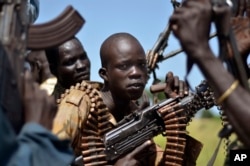A new United Nations report accuses South Sudanese soldiers and affiliated militias of using mass rape as a weapon of terror and of employing a “scorched earth policy” against the civilian population.
The report, which was launched by U.N. Human Rights Office in Geneva, calls the scale and type of sexual violence committed primarily by government SPLA (Sudanese Peoples Liberation Army) and allied militias one of the most horrendous human rights situations in the world.
During the period of the report from April to September 2015, the U.N. recorded 1,300 reported rapes in oil-rich Unity State alone.
The report says sexual assaults are carried out with extreme brutality. It finds girls and women of all ages are subjected to multiple gang rapes. Some are then killed, while others are abducted and held in sexual slavery as so-called wives for soldiers in barracks.
Rape as wages
U.N. human rights spokesman Rupert Colville tells VOA that youth militia allied to the government are being allowed to rape women in lieu of wages.
“It seems they are not being paid, that they are being given carte blanche to rape and to steal cattle. Basically those are the two bits of war bounty they get — the women and the cattle. It is really an unbelievable picture and nothing is being done apparently by the government to stop it.”
Colville says the government received the report one week ago and has more or less denied some of the worst allegations.
He says the prevalence of rape and the deliberate and systematic way in which it is being carried out indicates that rape is being used as a weapon of war and as a means of terrorizing the civilian population.
Town, villages destroyed
That policy seems to be working, he says, as more than two million people have been forcibly displaced from their homes since South Sudan’s civil war began in December 2013. He says government forces and the militias have been systematically destroying the towns and villages abandoned by the people across southern and central Unity State.
“Massive destruction when, you know, one group captures another group’s town — destroyed three-quarters sometimes or more of the buildings and, what appears to be a sort of concerted effort to employ a scorched-earth policy, so they do not come back,” said Colville.
Colville says these horrific violations could likely amount to war crimes and crimes against humanity, given how widespread and systematic they are. He warns the deliberate targeting of civilians for killing, rape and pillage will continue until people are held accountable and punished for the crimes they commit.
At least 60 men suffocated by government forces
In a separate report Thursday, human rights group Amnesty International accused South Sudanese government forces deliberately suffocated at least 60 men and boys in a shipping container in Unity State in October. The rights group says war crimes have continued in South Sudan despite a peace deal signed in August 2015.
Amnesty International says South Sudanese government forces took dozens of men and some boys to the grounds of the former Comboni Catholic Church compound in Leer town and loaded them into a shipping container overnight. Witnesses told Amnesty that only one boy survived.
“We have multiple witness accounts who could hear these people banging on the walls, shouting, screaming,” said Michelle Kagari, Amnesty’s deputy regional director for eastern Africa.
Witnesses told Amnesty that the containers lacked air holes or vents. The group says evidence indicates that government forces stationed outside the container decided to keep the detainees locked inside even after some had died.
“The act of leaving men in a container clearly in distress, having knowledge of their distress, having the ability to do something about that distress, and allowing the men to eventually die of suffocation, that act is a war crime, irrespective of the status of the people,” said Kagari.
Amnesty International researchers visited the location where witnesses said the bodies were dumped, and were able to identify human remains.
Official reply
In an interview with VOA, South Sudan’s presidential spokesman Ateny Wek Ateny denied government involvement in these atrocities. “Our forces did not commit or did not kill any civilians in October," he said.
"However," Wek added, "we do condemn anyone who kills civilians in the strongest terms possible. But in this case, our forces did not commit any atrocities in Unity state. In Unity State, there are a number of militias that are actually operating, who are actually having the same military particulars as the army, and we strongly condemn them if they have killed these civilians.”
South Sudan’s warring parties agreed to a peace agreement in August 2015, to stem the violence that broke out in December 2013. However, fighting, killings, abductions, sexual violence and attacks on civilian property have continued to engulf several parts of the country.
Jill Craig also contributed to this report from Nairobi.






